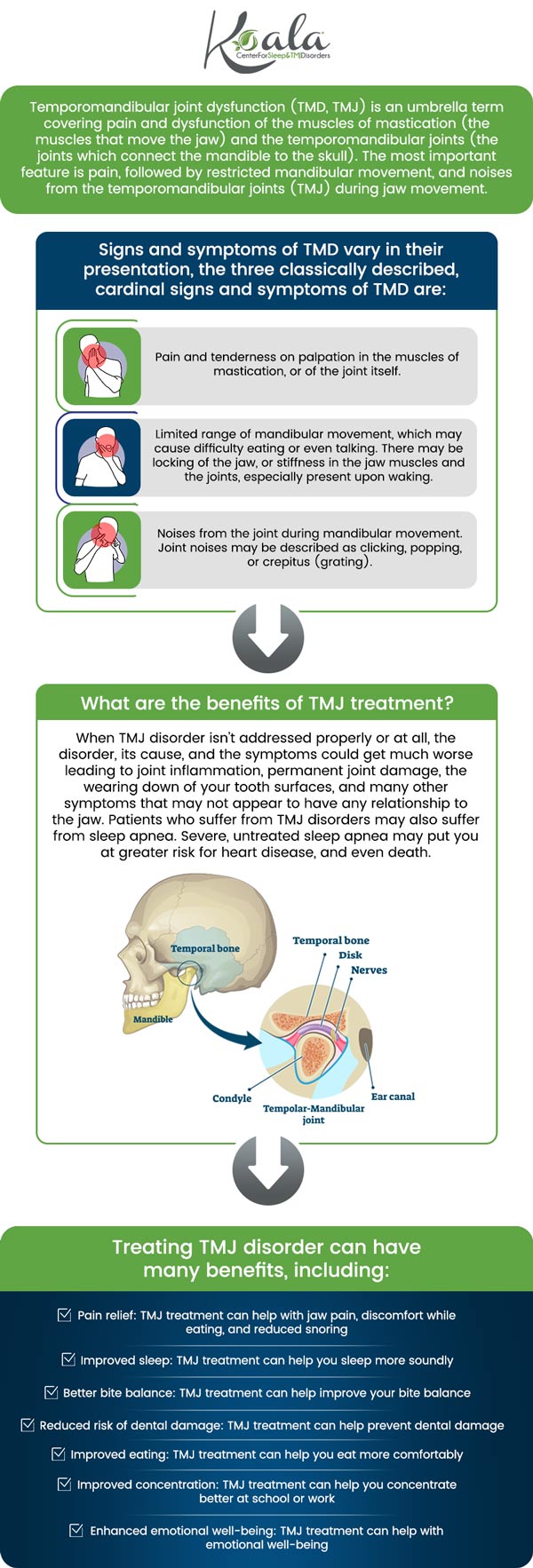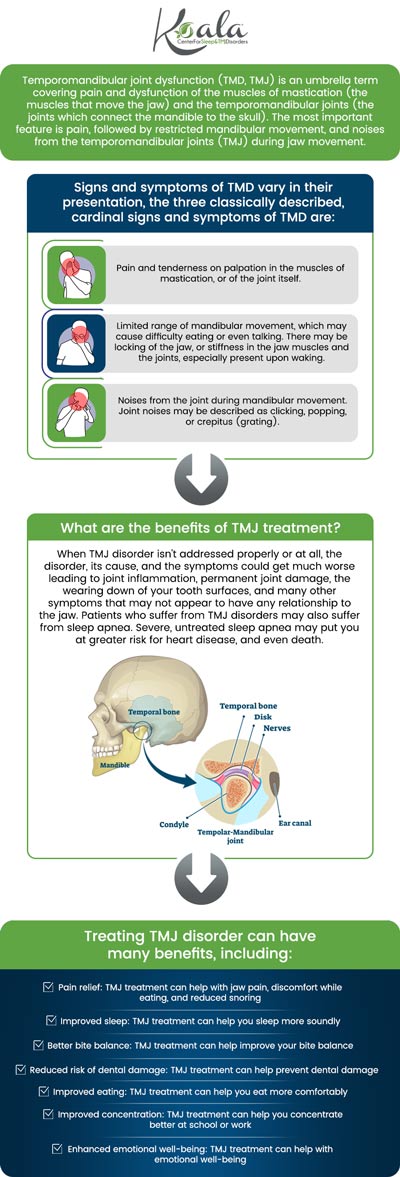TMJ Disorders Symptoms and Causes Questions and Answers
If you want to know more about TMJ, talk to our team of TMJ specialists at Koala® Center For Sleep & TMJ Disorders. For more information call us at one of our clinics today or request an appointment online. We serve patients from all over the USA. Locations in Bloomington IL, Peoria – Dunlap IL, El Paso TX and Wausau WI.




Table of Contents:
What causes TMJ?
What are the symptoms of TMJ?
At what age do you develop TMJ?
Does TMJ get better or worse with age?
TMJ disorders affect the temporomandibular joints, the two complex joints that connect the lower jaw (mandible) to the skull. Common symptoms of TMJ disorders include crepitus (grating, grinding, clicking, or popping sounds), localized pain, radiating pain, and an inability to fully open or close the jaw. There are many causes of TMJ disorders, although several are still not well-understood. Fortunately, there are several safe and effective treatment options that can help ameliorate symptoms of TMJ disorders.
There are several causes of TMJ disorders, including:
– Teeth Grinding or Clenching — Many people believe that stress is the main cause of TMJ disorder, but this is only partially correct; it is the effects of the stress that cause problems in the temporomandibular joints, such as through muscle tension and clenching or grinding teeth. Clenching and grinding can lead to TMJ disorder over time as these actions place a great deal of stress on the joints and teeth. Although lifestyle changes are often encouraged, there are effective dental solutions that can help alleviate immediate pain and prevent the grinding and clenching that is causing the TMJ disorder.
– Joint Injury — An injury to the joint or jaw is another common cause of TMJ disorder; even an injury to the surrounding muscles can lead to pain. A traumatic impact to the head can dislocate the disk between the ball and socket of the temporomandibular joint or the jaw can be moved out of proper alignment. In cases where an injury is involved, once the body heals from the trauma, pain may resolve on its own. Other times, the injury can do permanent damage and must be addressed by a TMJ dentist in order to find lasting relief.
– Arthritis — Just like joints elsewhere in the body, the temporomandibular joints can be affected by arthritis, including osteoarthritis and rheumatoid arthritis. These types of arthritis may attack the TMJ, causing one or both of the joints to slowly deteriorate over time. Since arthritis is a degenerative condition, the symptoms are not likely to reverse themselves or improve without medical intervention.
Common symptoms of TMJ disorders include:
– Pain around the jaw, neck, face, ears
– Problems chewing normally and pain when eating
– Clicking or popping sounds (crepitus) in the jaw when chewing
– Headaches
– Trouble sleeping normally
– Dizziness
– Ringing in the ears
– Joint pain
– Muscle spasms and swelling around the jaw
Dysfunction of the temporomandibular joint can develop at any age; its development is dependent on several factors, including lifestyle, injury and genetics. It is estimated that around 3 percent of the US population experience some type of TMJ disorder, which equates to about 10 million people. It more commonly occurs in adulthood, but also affects children and adolescents.
If TMJ pain is caused by the teeth and jaw moving and shifting during maturation, it may go away when the jaw is fully developed and formed. However, TMJ pain should not be ignored in hopes that it will someday go away. This type of pain can become worse if left untreated, and can develop into serious complications that may require surgery to repair.
At Koala® Center For Sleep & TMJ Disorders, we are dedicated to helping you find relief from your TMJ disorder with proven and effective treatments. Our kind and compassionate professionals specialize in treating TMJ disorders and can help you find the best treatment for your unique situation. Call us today to book an appointment for TMJ treatment, or visit one of our eight locations: in Bloomington, IL; Peoria – Dunlap, IL; Wausau, WI; and El Paso, TX. We look forward to serving you!

Additional Services You May Need
▸ KoalaKIDZzz®
▸ Sleep Apnea
▸ Snoring
▸ TMJ Disorder
▸ Fatigue
▸ Sleep Disorders
▸ Weight Loss
▸ CPAP Alternative
▸ Oral Appliances




